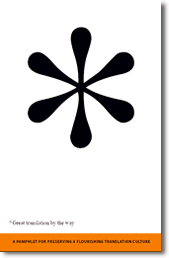August 5, 2009
Taking stock a year on
Although we try not to count our chickens before they’ve hatched, over the course of the previous year the above Pamphlet has produced positive results, both nationally and internationally, giving the Dutch Foundation for Literature, the Flemish Literature Fund, the Foundation for the Production and Translation of Dutch Literature, the Dutch Language Union and the Expertise Centre for Literary Translation grounds for optimism about the future.
An overview of these results is provided below.
Master’s Programme in Literary Translation
In March the Dutch Language Union announced that its Committee of Ministers was willing to support a study of the feasibility of a Master’s Programme in Literary Translation, to be established in both the Netherlands and Flanders. The association of deans of Dutch and Flemish faculties of literature has meanwhile agreed that the University of Utrecht and the Lessius College of Higher Professional Education in Antwerp will provide the necessary team of experts. The Committee of Ministers is prepared to grant an annual subsidy of up to €100,000 for an initial three-year period. Pilot programmes are scheduled for September 2010 in the Netherlands and Flanders.
Translation into Dutch: Dutch Foundation for Literature to intensify its translation policy
The Dutch Foundation for Literature is to deploy extra resources to promote the expertise of literary translators and encourage fresh talent. Mentorships will be linked to incentive subsidies, the mentorships budget has been increased (also for more experienced translators), and courses and master classes will continue during the 2009-2012 policy period. The budget for project grants has likewise been increased, one of the aims being to step up investment in high-quality translation projects by excellent translators. Scope will also be extended for accommodating translators in European translation centres or enabling them to participate in specific translation programmes abroad, and the Foundation will work with partners on initiatives designed to increase translators’ visibility and strengthen their position as cultural entrepreneurs.
Translation from Dutch: bigger budget for the Foundation for the Production and Translation of Dutch Literature
The Ministry of Education, Culture and Science has allocated extra resources to the Foundation for the Production and Translation of Dutch Literature (NLPVF) for the 2009-2012 period, to promote the quality of translations of Dutch literature. These funds will be used to set up more translation workshops and increase the number of mentorships for translators of Dutch literature and literary non-fiction, in partnership with the Expertise Centre for Literary Translation. Where the need arises, the NLPVF is now also urging foreign publishers to pay translators a fairer fee, offering a 70% subsidy from its extra resources.
European developments
In the European context, too, the English translation of the Pamphlet appears to be bearing fruit; the background paper of the European Commission’s Conference on Literary Translation and Culture, held on 20 April 2009 in Brussels, drew heavily from the Pamphlet, as did the speeches by Commission President José Manuel Barroso and EU Commissioner for Multilingualism, Leonard Orban. It is gradually beginning to dawn on ‘Brussels’ that literary translation is a form of cultural mediation, as posited in the Pamphlet, and that such mediation, by arousing interest in other cultures, has the potential to counteract the apathy that has up to now characterised the European electorate’s attitude towards the Union. CEATL, the European Council of Associations of Literary Translators, and RECIT, the European Network of International Centres for Literary Translation, will shortly submit proposals to the European Commission for a new European Culture Programme for 2013-2019, with a central focus on the remuneration and mobility of literary translators.
New website
The Dutch Foundation for Literature and the NLPVF are working on a new website designed to bring interesting authors and books from less well-known and less translated literatures to public notice, with a view to promoting the diversity of literature on offer.
New literature fund
The new literature fund that will result from the merger of the Dutch Foundation for Literature and the NLPVF will request extra resources from the Ministry of Education, Culture and Science for the three objectives listed in the Pamphlet, i.e. increasing the visibility of literary translators, providing extra financial scope for translations of culturally significant works of non-fiction and protecting literary diversity by providing publishers with translation and production subsidies for ‘difficult’ books or genres. When the merger was decided upon by the foundations and the ministry, the latter was in favour of intensifying translation policy and undertook to support such a move.
- Greetje van den Bergh (acting director, Dutch Foundation for Literature)
- Peter Bergsma (director, Amsterdam Translators’ House)
- Henk Pröpper (director, NLPVF)
- Pieter Jan van der Veen (senior policy officer, Dutch Foundation for Literature)
* Great translation by the way: A pamphlet for preserving a flourishing translation culture
Research and original Dutch text: Martin de Haan and Rokus Hofstede. The Pamphlet was commissioned by the Dutch Foundation for Literature, the Flemish Literature Fund, the Foundation for the Production and Translation of Dutch Literature, the Dutch Language Union and the Expertise Centre for Literary Translation.
The Dutch and English versions of the Pamphlet can be downloaded at www.vertaalpleidooi.nl, www.fondsvoordeletteren.nl and www.nlpvf.nl.
